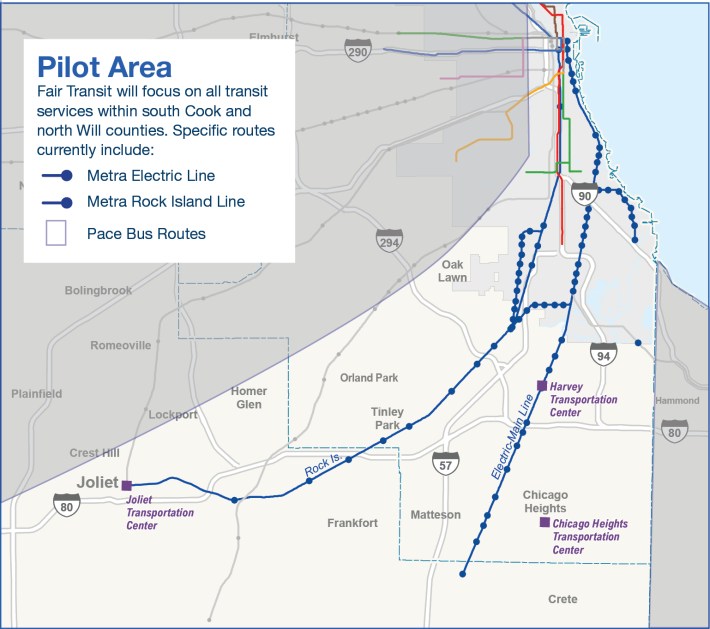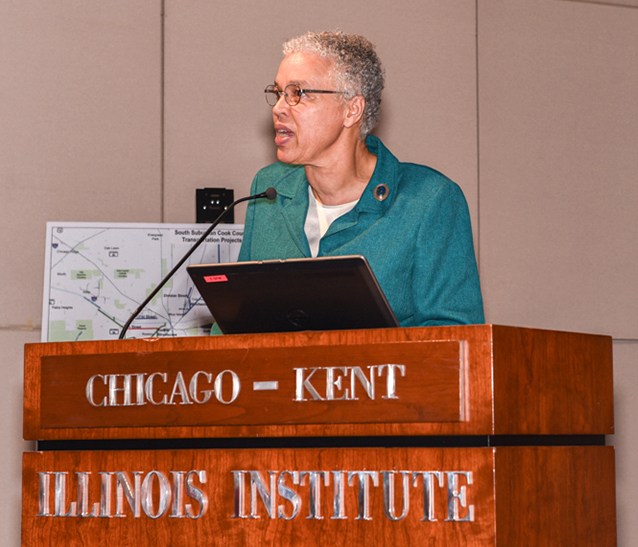It's getting real folks. After many years of lobbying by transit advocates, next month Cook County is launching the Fair Transit South Cook pilot. The program will bring more affordable and convenient service on the Metra Electric District and Rock Island District commuter rail lines for South Side and south suburban residents. The pilot halves the cost of a ride on these lines, and increases frequency on Pace's 352-Halsted route, which links the 95th Street Red Line stop with the Pace Chicago Heights Terminal and will eventually be upgraded to Pulse express bus service.
I caught up with Cook County president Toni Preckwinkle to discuss the history of this effort, its benefits for South Side and Southland residents, and the city of Chicago's resistance to participating in the program by providing free, county-subsidized transfers from Metra to the CTA.

John Greenfield: How many years have you been working on this project?
Toni Preckwinkle: [Laughs loudly.] Something like five years ago we began work on a long-range transportation plan. The county had pretty much been focused on roads and bridges prior to that. And actually we had a department of highways -- it wasn't even called transportation. As a result of the work on that plan, which took us about 18 months, we broadened our focus to include, public transportation, rail infrastructure, bike lanes. So we took a broader view of what constitutes transportation. And then we began looking at how we could be more supportive of transit.
There of course has been an active group, the Coalition for a Modern Metra Electric, they have been lobbying for a long time, and I knew about them because the Metra Electric goes through the Fourth Ward [the Mid-South Lakefront district where Preckwinkle was alderman from 1991 to 2010.] As the county refocused or expanded its vision of what it should be doing in terms of transportation, our interests coalesced with theirs. So we've been working with them and the Active Transportation Alliance as external advocates. And we've been negotiating with Metra and Pace. As a result, we're kicking off the three-year demonstration on Monday, January 4.
Greenfield: How do you feel this is going to help South Siders?
Preckwinkle: One of the thing we looked at in terms of transportation was, what parts of the county are not well-served. If you're going to look at things through an equity lens, you do the best to address inequities and past failures on the part of government. And the people in the county who are least-well-served by transit are people on the South Side and in the south suburbs. And so we are investing in this partnership with Metra and Pace, for improved transportation access and lower cost for people in those areas.
Greenfield: The one piece of the puzzle that hasn't been achieved yet is getting CTA involvement, with things like free transfers to the CTA. Are you hopeful that's something that might be accomplished in the near future?
Preckwinkle: Yes, I'm hopeful.
Greenfield: What's going on on that front?
Preckwinkle: We continue to hope that they'll decide that it's their interest to work with us.
Greenfield: What do you think of the arguments coming from the city of Chicago, concerns about cannibalizing CTA service, or that this might not wind up being financially sustainable, since it's being subsidized by the county?
Preckwinkle: The county has put up $35 million for the next three years to support Metra and Pace so that they're held harmless from a financial point of view, and we're prepared to put money in to support the CTA as well. So if we say we're going to compensate you for any losses you're going to incur, that kind of addresses the argument, don't you think?
Greenfield: So why do you think they're being resistant to this?
Preckwinkle: I think you should ask them.
The CTA previously provided the following statement about Fair Transit South Cook:
The agreement between Metra and the County will provide lower fares for residents of the South Side and south suburban Cook County, bringing them in line with CTA fares systemwide. CTA, along with the other regional service boards and the county, will be closely watching the results of this pilot, so that we can fully understand the impacts on regional ridership and travel patterns. This information will help inform our ongoing dialogue with the county and the service boards about our shared goal of improving regional transit and ensuring robust transit options. The best way to achieve these goals is to pursue viable options that are sustainable in the long-term, from both an operational and financial perspective.
Greenfield: Anything else you'd like to tell me about this initiative?
Preckwinkle: I'm very grateful to the advocacy community that has been banging this drum for a long time, and we're grateful that we've been able to bring together the county and Metra and Pace to address the concerns that the advocates have raised, and frankly what our own research has shown, about parts of the county that are not well-served by public transit, and trying to address those inequities.
Follow John Greenfield on Twitter at @greenfieldjohn.





